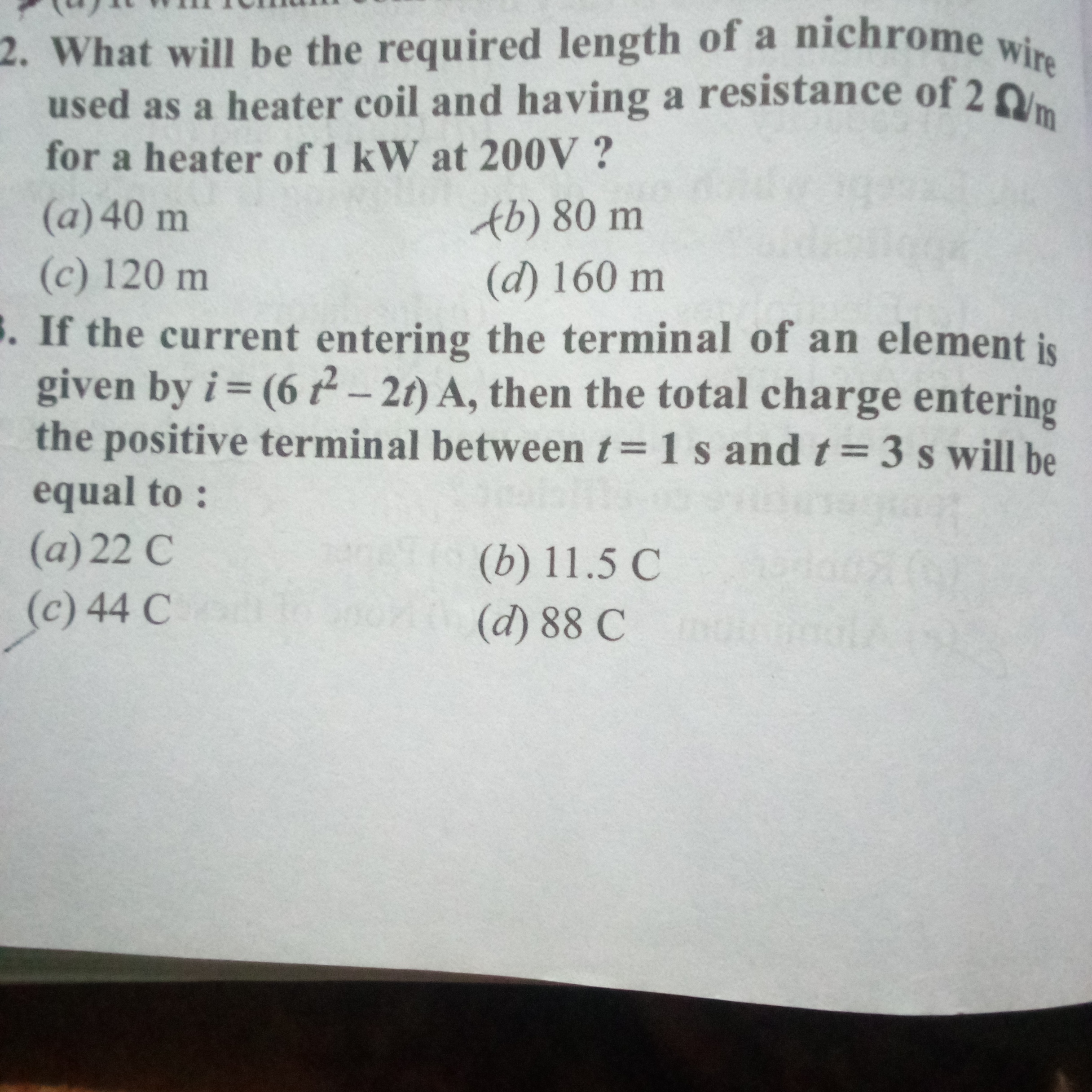What will be the required length of a nichrome wire used as a heater coil and having a resistance of 2 Ohm/m for a heater of 1 kW at 200 V? If the current entering the terminal of... What will be the required length of a nichrome wire used as a heater coil and having a resistance of 2 Ohm/m for a heater of 1 kW at 200 V? If the current entering the terminal of an element is given by i = (6t^2 - 2t) A, then the total charge entering the positive terminal between t = 1 s and t = 3 s will be equal to:

Understand the Problem
The question is asking for the required length of a nichrome wire for a heater coil and the charge entering a terminal based on the given current equation. We need to apply the formulas for electric power and charge to find solutions for each part.
Answer
The required length is \( 20 \, m \) and the total charge is \( 44 \, C \).
Answer for screen readers
The required length of the nichrome wire is ( 20 , m ) and the total charge entering the terminal is ( 44 , C ).
Steps to Solve
- Calculate the required length for the heater coil
To find the required length of the nichrome wire, we use the formula for electrical power:
$$ P = \frac{V^2}{R} $$
Where:
- ( P = 1000 , \text{W} ) (1 kW)
- ( V = 200 , \text{V} )
Rearranging this formula to solve for the resistance ( R ):
$$ R = \frac{V^2}{P} $$
Substituting the values:
$$ R = \frac{(200)^2}{1000} $$
Calculating ( R ):
$$ R = \frac{40000}{1000} = 40 , \Omega $$
Since the resistance per meter of the nichrome wire is given as ( 2 , \Omega/m ), we can use the formula for total resistance:
$$ R = r \cdot L $$
Where:
- ( r = 2 , \Omega/m )
- ( L = ? )
Setting the equations equal:
$$ 40 = 2 \cdot L $$
Solving for ( L ):
$$ L = \frac{40}{2} = 20 , \text{m} $$
- Calculate the total charge entering the terminal
The charge ( Q ) can be found using the equation:
$$ Q = \int i , dt $$
Given the current equation:
$$ i = 6t^2 - 2t $$
We need to find the charge between ( t = 1 , s ) and ( t = 3 , s ):
$$ Q = \int_{1}^{3} (6t^2 - 2t) , dt $$
Calculating the integral:
First, find the antiderivative:
$$ \int (6t^2 - 2t) , dt = 2t^3 - t^2 + C $$
Now, evaluate this from ( t = 1 ) to ( t = 3 ):
$$ Q = \left[ 2(3^3) - (3^2) \right] - \left[ 2(1^3) - (1^2) \right] $$
Calculating each part:
$$ Q = \left[ 2 \cdot 27 - 9 \right] - \left[ 2 \cdot 1 - 1 \right] $$
$$ Q = \left[ 54 - 9 \right] - \left[ 2 - 1 \right] $$
$$ Q = 45 - 1 = 44 , C $$
The required length of the nichrome wire is ( 20 , m ) and the total charge entering the terminal is ( 44 , C ).
More Information
The calculations show the relationship between power, voltage, and length of wire needed for a heating coil. It demonstrates the use of calculus in finding charge over specific time intervals.
Tips
- Misunderstanding power and resistance: Be careful to clearly distinguish between power, voltage, and resistance when applying formulas.
- Incorrect limits in integration: Ensure the correct limits are used in definite integrals to find the charge.
AI-generated content may contain errors. Please verify critical information